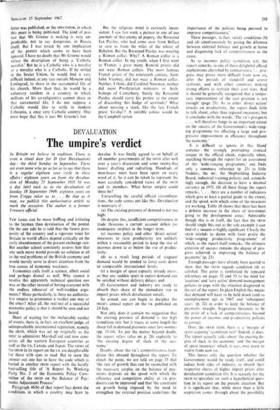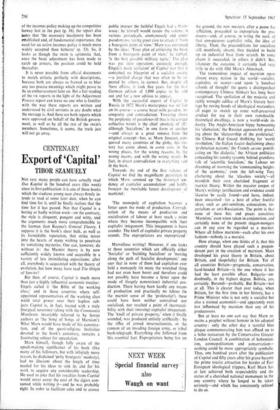The umpire's verdict
DEVALUATION
In Britain we believe in tradition. There is even a ritual date for D (for Devaluation) day : the third Sunday in September. There are even some who go as far as to say that there is a regular eighteen year cycle in these affairs: eighteen years on from the devalua- tion of Monday 2! September 1931 (it was a day late) took us to the devaluation of
Sunday 18 September 1949; eighteen years on from Cripps takes us to . . . Be that as it may, we publish this authoritative article to mark the occasion. The author is a former Treasury official.
Few issues can be more baffling and irritating to the layman than devaluation of the pound. On the one side he is told than the future pros- perity of the country and a vigorous voice for Britain in world affairs depend critically on the early abandonment of the present exchange rate. But another school constantly assures him that any such move would provide no solution at all to the real problems of the British economy and would merely serve to divert attention from the true causes of economic weakness.
Economics calls itself a science, albeit social and perhaps dismal as well. Why cannot it resolve This apparently technical question one way or the other instead of boring everyone with the endless rehearsal of well-trodden argu- ments? More particularly,"is there no authorita- tive umpire to pronounce a verdict one way or the other? After all, the real test of a successful economic policy is that it should be seen and not heard.
Short of waiting for the ineluctable verdict of events, there is, in fact, an excellent judge, of unimpeachable international reputation, namely the OECD, which was set up originally as the OEEC to administer Marshall aid and now com- prises all the western European countries as well as the us, Canada and Japan. The views of the OECD in its report on the UK are decipherable for those with eyes to read. But to tease the answer out one has to have the code which is buried in another OECD report with the hardly best-selling title of 'A Report by Working Party No. 3 of the Economic Policy Com- mittee of the OECD on the Balance of Pay- ments Adjustment Process.'
Paragraph 46(b) of that report lays down the conditions in which a country may have to
devalue. It was finally agreed to on behalf of all member governments of the OECD after well
over a year's discussion and some twenty-five
hours' drafting and redrafting. Hundreds of man-hours must have been spent on every word of it. So it can be taken to represent the most carefully considered views of the OECD and its members. What better umpire could there be?
Unravelling the careful official circumlocu- tions, the code comes out like this. Devaluation is necessary if: (a) The existing pressure of demand is not too high; (b) despite this, insufficient competitiveness in trade threatens a current account deficit (or inadequate surplus) in the longer term;
(c) incomes policy and other 'direct action' measures to .raise productivity are unlikely within a reasonable period to keep the rise of incomes down to or below the rise of produc- tivity;
(d) as a result long periods of stagnant demand would be needed to force costs down to comparable international levels;
(e) a margin of spare capacity already exists. so that any sudden spurt in export demand can be satisfied without delivery delays; and
(f) Government and industry are ready to absorb their share of the immediate rise in import prices which devaluation entails.
So armed, one can begin to decipher the oEc,p's annual report on the uic published on 24 July.
Not only does it contain no suggestion that the existing pressure of demand is too high (condition (a)); but it traces at some length the sharp fall in demand pressures since last summer (pp. 13-14). To put the matter beyond doubt, the report refers (also on p. 28) explicitly lo 'the existing degree of slack in the eco- nomy.'
Doubts about the UK'S competitiveness (con- dition (b)) abound throughout the report. To clinch the point, we are told on page 33 that 'the rate of growth that can be reconciled with
the necessary surplus on the balance of pay- ments depends on the speed with which the efficiency and competitive ability of uic pro- ducers can be improved' and that 'the constraint on growth being imposed by the need to strengthen the external position underlines the importance of the policies being pursued to improve competitiveness.'
These passages, in fact, satisfy conditions (b) and (d) simultaneously by posing the dilemma between external balance and growth at home and diagnosing lack of competitiveness as the cause.
As to incomes policy (condition (c)), the report remarks, in one of those delightful official euphemisms cherished by connoisseurs, '... pro- gress may prove more difficult from now on, after the periods of standstill and severe restraint, and with other countries making strong efforts to restrain their cost rises. And it should be generally recognised that a tempo- rary improvement of the cost position is not enough' (page 21). As to other 'direct action' attacks on productivity, the report finds little to talk about, other than regional measures; but it concludes with the words, 'The tries prospects . . . will therefore hinge to an important extent on the success of the Government's wide-rang- ing programme for effecting a large and pro- gressive improvement in efficiency throughout the economy.'
It is difficult to ignore in this bland sentence the strongly protruding ironical tongue in the official cheek, especially when, searching through the report for an assessment of this 'wide-ranging programme,' one finds only a summary reference (p. 23) to little Neddies, the Inc, the Shipbuilding Industry Board, industrial training policies and, astonish- ingly enough, the decision to have a decimal currency in 1971. Of all these things the report remarks, '. . . there arc a number of indicators which give at least a partial guide to the extent, and the speed, with which some of the measures are working. Table 10 shows that there has been a definite increase in the share of investment going to the development areas.' Admirable though this is in itself, the fact that the awn should single this out as the sole example it can find of a success is highly significant. Clearly the OECD intends to damn with faint praise the 'wide-ranging productivity programme' of which, as the report itself remarks, 'the ultimate criterion of success remains the degree of pro- gress achieved in improving the balance of payments' (p. 23).
Enough passages have already been quoted to show that the OECD regards condition (d) as satisfied. The point is reinforced by repeated references on pages 32 and 33 to the need for 'cautious' and 'very active' demand management policies to cope with the situation diagnosed in the rest of the report. In plain English this means that demand will have to be held down (and so unemplciyment up) in 1967 and 'subsequent years' (p. 32) in order to keep the balance of payments straight. Stagnation threatens to be the price of a tack of competitiveness beyond the power of incomes and productivity policies to correct.
Does the OECD think there is a 'margin of spare capacity' (condition (e))? Indeed, it does. The report actually talks about 'the existing de- gree of slack in the economy' and 'the margin of spare resources' which, it says, may cease to widen from now on.
This leaves only the question whether the Government would be ready itself, and could induce both sides of industry, to absorb their respective shares of higher import prices after devaluation (condition (f)). It is scarcely for the OECD to speculate on such a hypothetical ques- tion in its report on the present situation. But it is significant that, while more than a little scepticism comes through about the possibility of the incomes policy making up the competitive leeway lost in the past (p. 18), the report also notes that 'the necessary 'machinery has been established and, of fundamental importance, the need for an active incomes policy is much more widely accepted than hitherto' (p. 33). So, it looks as though the OECD is optimistic that, once the basic adjustment has been made to catch up arrears, the position could be held thereafter.
It is never possible from official documents to match criteria perfectly with descriptions, because both are always so framed as to blur any too precise meanings which might prove to be an embarrassment later on. But a fair reading of the UK reports in the light of the Adjustment Process report can leave no one who is familiar with the way these reports are written and understood by civil servants in any doubt what the message is. And these are both reports which were approved on behalf of the British govern- ment, as well as by all the rest of the OECD'S members. Sometimes, it seems, the truth just will not go away.































 Previous page
Previous page